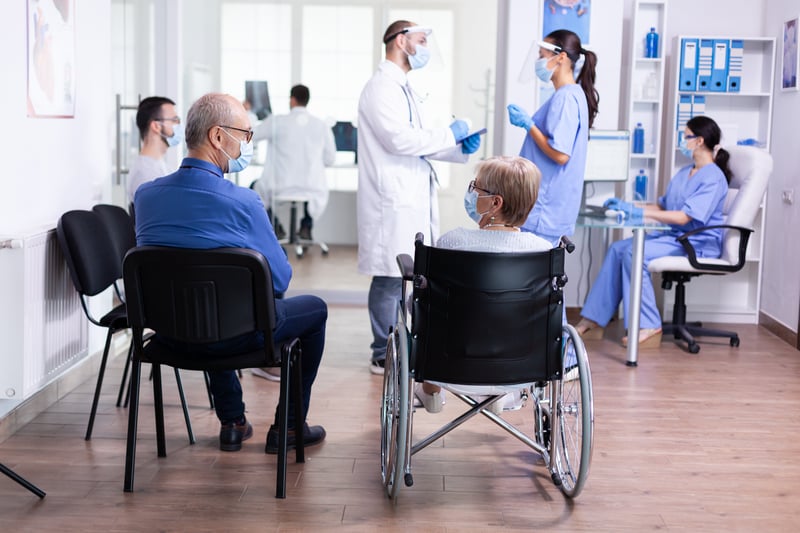Get Healthy!

- Posted April 19, 2023
Is It Time to End Universal Masking in Hospitals, Clinics? Many Experts Think So
Health care facilities remain one of the last places left in the United States with COVID-era mask requirements still in effect.
It's time for that to end, experts say.
A prestigious collection of infection disease experts and epidemiologists say universal masking requirements in health care settings should be lifted, according to a commentary they published April 18 in the Annals of Internal Medicine.
COVID has reached the point where it should be managed in a way similar to how other respiratory viruses are handled in hospitals, doctor's offices and long-term care facilities, the editorial argues.
"We're in a very different stage of the pandemic, a more stable phase,"said lead author Dr. Erica Shenoy, medical director for infection control at Massachusetts General Hospital in Boston. "Masking has gone away in every sector of society, with the exception of health care settings."
At this point, nearly all Americans carry COVID antibodies acquired through vaccination or natural infection, Shenoy noted. There are also effective therapies for people who become infected with COVID, and the emerging coronavirus variants have tended to produce less severe disease.
"Because of all those things, we're controlling COVID in a way that we were unable to do earlier in the pandemic,"Shenoy said.
At the same time, the editorial writers said masking is still wise in some health care situations.
Health care personnel should still use masks when engaging in activities that could generate splashes or sprays, the editorial said. Patients also should be asked to mask if they have respiratory symptoms and might spread germs by sneezing or coughing.
The editorial's co-authors included experts from Harvard Medical School, the University of Iowa, Dartmouth College, Tufts University and Washington University School of Medicine in St. Louis.
Other infectious disease experts tended to agree with the editorial.
"I do not think universal masking strategies serve a purpose any longer, especially in non patient-facing activities,"said Dr. Amesh Adalja, a senior scholar with the Johns Hopkins Center for Health Security in Baltimore. "The management of COVID is at a point where it can be considered alongside other respiratory viruses dealt with day in and day out, and universal masking is not something that has ever been indicated for those other respiratory pathogens."
A number of health care systems and individual clinics already have made the decision to stop requiring masks, experts said.
For example, Vanderbilt University Medical Center in Nashville has already lifted its masking requirements, said Dr. William Schaffner, a professor of infectious diseases at Vanderbilt and medical director of the National Foundation for Infectious Diseases.
"We continue to emphasize that there will be individuals who will continue to wish to wear the mask for reasons of their own protection, because they're in high-risk groups, and the emphasis has been that all those people should be supported by everyone,"Schaffner said. "But as a routine, even in patient care areas, it is now no longer obligatory to wear a mask."
In the editorial, Shenoy and her colleagues weighed the protection afforded by masking against its downsides.
"it's no surprise that masking impedes communication. It also can obscure facial expression,"Shenoy said. "While these are harder things to measure in terms of isolation or the impact it has on the human connection, those sorts of things are real and they have been documented in studies. And so it's not costless."
Shenoy gave the example of a hard-of-hearing patient who might not adjust their medications correctly because masking muffled their doctor's voice.
Universal masking might be need to be re-instituted in the future, based on what's happening at a particular facility, Shenoy said.
"We try to make it very clear we're not saying that masking didn't have a place or may not have a place in the future,"Shenoy said. "It's just that in 2023, given the totality of everything that we have observed and where we are in this stage of the pandemic, this is not the time to continue this particular intervention."
"If we're in a future situation of a new pandemic, masking would be one of the first tools you take out of the arsenal,"Shenoy added. "In the near or moderate term, masking might be appropriate if you had significant localized outbreaks -- if there were a surge, and not just in COVID, but other respiratory viruses."
Seniors and people whose health puts them at high risk for severe COVID also should consider continuing to wear a mask, and not just in the doctor's office, said Dr. Waleed Javaid, director of infection prevention and control at Mount Sinai Downtown.
"For example, if my parents were traveling. I would tell them, 'Hey guys, please continue to mask while you travel,"Javaid said. "They're in their 80s, they have other risks. I'll tell them to continue to mask."
More information
The Mayo Clinic has more about face masks.
SOURCES: Erica Shenoy, MD, PhD, medical director, infection control, Massachusetts General Hospital, Boston; Amesh Adalja, MD, senior scholar, Johns Hopkins Center for Health Security, Baltimore; William Schaffner, MD, professor, infectious diseases, Vanderbilt University, and medical director, National Foundation for Infectious Diseases; Waleed Javaid, MD, director, infection prevention and control, Mount Sinai Downtown; Annals of Internal Medicine, April 18, 2023






